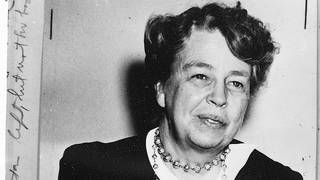First Lady of the World: Eleanor Roosevelt's Impact on New Deal to U.N. Declaration of Human Rights

2020 marks the 100th anniversary of the 19th Amendment, which guaranteed women the right to vote, and we begin the new decade with a New Year's Day special about one of the most influential women in U.S. politics: first lady Eleanor Roosevelt. She served as the first lady of the United States from 1933, when her husband Franklin D. Roosevelt took office, until his death during his fourth term in office in 1945. She went on to serve as United States delegate to the United Nations General Assembly and spearheaded the United Nations Declaration on Human Rights. President Harry Truman later called her the "First Lady of the World." We speak with the prize-winning historian Blanche Wiesen Cook, distinguished professor of history and women's studies at John Jay College and the Graduate Center of the City University of New York. She is the author of the definitive three-part biography of the former first lady: "Eleanor Roosevelt, Volume 1: The Early Years, 1884-1933," "Eleanor Roosevelt, Volume 2: The Defining Years, 1933-1938" and "Eleanor Roosevelt, Volume 3: The War Years and After."